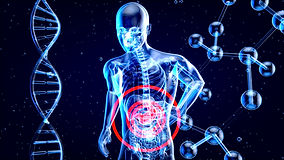
Omega-3
Home / Evolve / Physical / Key Supplements / Omega 3's
What Omega-3s Actually Do
Omega-3s are essential fats — your body needs them, but can’t make them. That means you either get them through diet or supplementation, or you run at a deficit. And unless you’re eating high-quality oily fish like salmon, sardines, or mackerel several times a week, the odds are you’re falling short.
These fats aren’t optional. Omega-3s play a central role in brain health, joint mobility, cardiovascular performance, hormone regulation, and the body’s ability to manage inflammation. They’re built into the structure of every cell membrane in your body — influencing how cells communicate, how your brain processes information, and how your nervous system responds to stress.
DHA (docosahexaenoic acid) and EPA (eicosapentaenoic acid) are the two key omega-3s responsible for these effects — and they’re found primarily in fish and fish oil. ALA (alpha-linolenic acid), found in plant sources like flaxseed and chia, doesn’t cut it. The body converts ALA into DHA and EPA very poorly — often less than 5%. If you’re relying on chia seeds for your omega-3 intake, you’re missing the mark.
A high-quality fish oil supplement helps bridge the gap. It’s not about adding something extra — it’s about giving your body what it needs to function properly. Sharp cognition. Stronger joints. Lower inflammation. Better blood flow. Stable mood. This is the foundation, not the bonus.
If you’re pushing your body in training, managing high levels of stress, or just trying to age with strength and clarity, omega-3s are non-negotiable. The real question is whether you’re supplying your body with enough of what it actually needs to perform, recover, and thrive.

Brain, Inflammation, and Recovery
Omega-3s don’t just support the body — they protect the mind. These essential fatty acids are deeply neuroprotective, meaning they defend your brain against stress, aging, and decline. They help regulate mood, improve memory, sharpen focus, and build emotional resilience. Low levels of omega-3s have been linked to anxiety, depression, poor sleep, and cognitive decline — especially as you age.
But their power doesn’t stop with the brain. Omega-3s are one of the most effective anti-inflammatory tools available. Unlike over-the-counter painkillers that only mask the symptoms, omega-3s work at the root — reducing inflammation at the cellular level. This supports joint integrity, helps with muscle recovery, and protects your heart and blood vessels under strain.
Whether you’re lifting heavy, training hard, or simply trying to stay sharp through high-stress days, omega-3s play a central role. They help reduce joint stiffness, improve blood flow, and even assist in hormone regulation — all while keeping inflammation in check so you can train consistently without breaking down.
If you’ve been dealing with sore joints, low mood, brain fog, or chronic fatigue, don’t just push through it blindly. These are signs — and one of the most common deficiencies behind them is omega-3. You wouldn’t build a house without the right materials. Don’t expect your brain or body to function at its peak without them either.
Your body can’t produce omega-3s on its own. That means it’s up to you to supply what it needs — or pay the price in performance, clarity, and recovery.
What to Look for in a Quality Supplement
DHA + EPA Content
Don’t just look at the total amount of fish oil on the label — focus on the actual dose of DHA and EPA, the active omega-3s that drive results. Some products boast 1,000 mg of fish oil but only deliver 300 mg of usable DHA + EPA. That’s not enough. Always read the breakdown.
Triglyceride Form
Fish oil comes in different forms. The triglyceride form is more bioavailable and better absorbed than the cheaper ethyl ester version found in many low-end products. It might cost a little more, but your body will actually use what you take — and that’s the point.
Purity and Testing
Cheap fish oil can be contaminated with heavy metals, PCBs, or can suffer from oxidation during processing. These aren’t minor concerns — they’re toxic to your system. Choose brands that are third-party tested for purity and potency. Clean oil equals clean results.
Freshness
Fish oil should never smell like rotten fish. If you open a capsule and it stinks, it’s gone rancid — and rancid oil is harmful. Fresh fish oil has a neutral or slightly marine scent, but it should never make you gag. Quality products preserve freshness with proper encapsulation and storage.
Sourcing
Look for oils sourced from wild-caught, cold-water fish like sardines, anchovies or mackerel. These species are lower on the food chain and carry fewer toxins. Krill oil is also a strong option, offering higher bioavailability and added antioxidants like astaxanthin.
Daily Dose
Aim for 1,000–3,000 mg of combined DHA + EPA per day, depending on your training load, stress levels, and recovery needs. Consistency matters more than megadosing — so find your dose and stick with it.
"Chronic inflammation is the root of most modern disease — omega-3s help put out the fire." — Dr. Andrew Weil
How to Take Omega-3s Effectively
With Food
Always take fish oil with a meal that contains fat. Omega-3s are fat-soluble, which means they’re absorbed much more effectively when paired with dietary fat. Taking them on an empty stomach or with low-fat meals reduces their impact — and wastes your dose.
Time of Day
There’s no perfect time to take fish oil. Morning, midday, or evening — it doesn’t matter. What does matter is consistency. Take it daily, at the same time, if that helps you remember, and make it part of your long-term routine. Results come from accumulation, not timing.
Storage
Fish oil is sensitive to light, heat, and air. Keep it in a cool, dark place, and once opened, store it in the fridge to prevent oxidation. Exposing your oil to high temperatures or leaving it unsealed will turn it rancid fast — and rancid oil is worse than useless.
Dosage
If you don’t eat fatty fish regularly, aim for at least 2,000 mg of combined DHA + EPA per day. Higher training loads, inflammation, or brain demands might push that closer to 3,000 mg. Don’t just go by “1 capsule daily” — base your dose on the actual content, not the suggestion on the label.
Plant-Based Options
If you follow a vegan or plant-based diet, fish oil isn’t an option — but algae oil is. It’s one of the only vegan sources that naturally contains DHA and sometimes EPA. Avoid relying on flax or chia alone — they don’t convert efficiently. Algae oil fills the gap without compromise.

Common Mistakes and Myths
Mistake: Taking Too Little
One of the most common errors with fish oil is underdosing. Just because the label says “1,000 mg fish oil” doesn’t mean you’re getting 1,000 mg of DHA + EPA. In fact, most products only deliver around 300 mg combined. Always check the actual EPA and DHA content — that’s what counts.
Mistake: Ignoring Freshness
If your fish oil smells or tastes like rotten fish, throw it out. Oxidised oil is not just ineffective — it’s harmful. Rancid fish oil creates oxidative stress in the body, which is the exact opposite of what omega-3s are supposed to do. Fresh oil should smell clean and mild.
Myth: You Don’t Need Omega-3s If You Eat Nuts and Seeds
Nuts and seeds contain ALA, a plant-based omega-3. But the body converts ALA to DHA and EPA at a very poor rate — often less than 5%. You’d need unrealistic amounts of flaxseed or chia just to get a fraction of what you’d get from a high-quality fish oil or algae oil.
Mistake: Buying Cheap Oils
Fish oil is not the supplement to cut corners on. Cheap oils often come with low bioavailability, poor sourcing, and a high risk of contamination with heavy metals or PCBs. They may also be oxidised by the time they reach your shelf. Always choose third-party tested brands that prioritise quality, purity, and proper storage.
Taking fish oil properly means treating it like the powerful tool it is — not just ticking a box. Get the dose right. Get the source right. And never compromise on quality.
Key Takeaways
Omega-3s are essential for brain, heart, and joint health.
DHA and EPA from fish oil are the most effective forms.
Most diets are deficient. Supplementation is often necessary.
Prioritise purity, dosage, and third-party testing.
Consistent intake, with fat, is key for results.
Anti-Inflammatory Intelligence
Most men train hard, push their limits, and chase progress — but overlook one of the most important pieces of the puzzle: inflammation. It’s not always obvious. It doesn’t scream like an injury or crash like burnout. But it builds in the background, quietly robbing you of recovery, energy, clarity, and gains.
Omega-3s are one of the few supplements proven to fight this kind of silent sabotage. They don’t just reduce inflammation at the surface — they work at the cellular level. They support joint health, protect your heart, stabilise your hormones, and keep your brain firing sharp under pressure. If your mind feels foggy, your energy flat, or your joints always sore — a lack of omega-3s could be part of the problem.
They also play a critical role in longevity and cognitive health. As you age, brain volume shrinks, memory fades, and resilience drops — unless you do something about it. Omega-3s are neuroprotective. They help maintain structure and function in the brain, preserve mental clarity, and even help regulate mood and stress responses.
This isn’t some overhyped performance powder. It’s a foundational tool that strengthens everything you’re already doing. When used properly — with the right dose, the right form, and consistent intake — omega-3s give you an edge most people never realise they’re missing.
Train hard. Eat smart. But don’t ignore the internal systems that actually hold it all together. Omega-3s are quiet, powerful, and essential — and the benefits only get bigger the longer you stay in the game. Live in a country where the sun is rarely seen in the winter months? There's a good chance you're vitamin D-deficient. Let's fix that.
"You are not what you eat. You are what your cells absorb — and omega-3s are cell-deep fuel." — Dr. Rhonda Patrick


